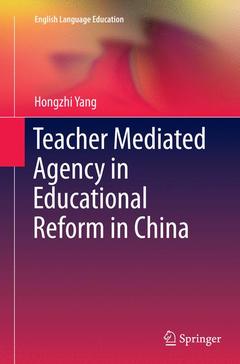Description
Teacher Mediated Agency in Educational Reform in China, 2015
English Language Education Series, Vol. 3
Author: Yang Hongzhi
Language: English
Subject for Teacher Mediated Agency in Educational Reform in China:
Keywords
Engeström activity theory; English curriculum reform in China; Vygotsky concept of ZDP; curriculum-based mediation; empowering teachers in pedagogical innovation; teacher agency; beliefs; knowledge; instructional practices; teacher roles in curriculum reform; top-down policies; bottom-up implementation; zone of proximal development
Approximative price 52.74 €
In Print (Delivery period: 15 days).
Add to cartPublication date: 10-2016
Support: Print on demand
Approximative price 52.74 €
In Print (Delivery period: 15 days).
Add to cartPublication date: 04-2015
213 p. · 15.5x23.5 cm · Hardback
Description
/li>Contents
/li>Comment
/li>
Offers insights on teacher agency as a factor in reforming the English as a Foreign Language curriculum in China
Provides a theoretical framework for analyzing teacher agency from a developmental perspective
Argues that curriculum reform in China needs to shift from top-down policies to bottom-up implementation

